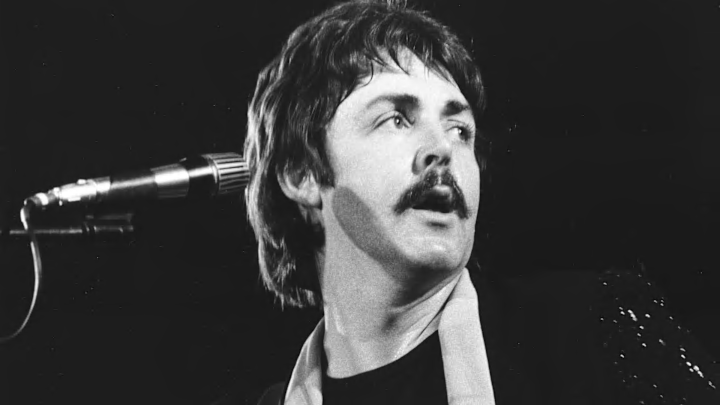Paul McCartney didn't know who he was after The Beatles. Who would? Leaving one of the most popular rock bands in the world was hard for Paul, especially since he was the only band member who wanted the group to stay together. However, after climbing out of a dark hole, he started again with his second band, Wings.
Paul wanted Wings to exist outside The Beatles' shadow. So, that meant no Beatles songs appeared on their setlists, something neither the fans nor the promoters enjoyed. It wasn't until the late 1970s that Paul felt comfortable playing his former band's tunes.
Paul McCartney decided he wouldn't perform any Beatles songs live while he established Wings
In his book The Lyrics: 1956 to the Present, Paul wrote that Wings was an experiment to see whether "life after The Beatles" existed and that "success could be followed." It was hard starting a new band initially. Everyone saw him as a Beatle and nothing else.
How do you start another band after having enormous success in your first? Paul was careful. "I knew that if I were to go ahead with this project I'd have to tough it out, but I had reserves of courage from being part of The Beatles when pennies were thrown at us at the village hall in Stroud, when we were still starting out," Paul wrote. "I had to put up with the equivalent once again…"
Wings started out just like The Beatles; they did small gigs, sometimes playing for only 50 pence at student centers.
Early on, Paul decided he wanted Wings to exist completely outside of The Beatles' shadow, and that meant not playing any of their songs, even when fans and promoters wanted to hear them. Why would he perform Beatles songs when trying to establish Wings as a separate act?
Paul told Esquire that he told himself, "Yeah, you're an ex-Beatle, but you're trying to do something new so you've got to leave that alone." He admits it was "a risky business because the promoters didn't like that." He added, "They said, 'Can't you just do 'Yesterday' at the end of the show?' 'No!' "For me it was, 'Too bad, I've got to do it this way. I don't want to rely on the Beatles' stuff."
Paul elaborated in The Lyrics, "That was what we had to fight against. It's just who I am; I am loath to duplicate anything or anyone, so I wanted Wings to be successful in its own right. From the beginning, then, it was obvious that we had to be resigned to the fact it would take time."
Paul started performing Beatles songs with Wings in the late 1970s
It wasn't until 1976 that Paul started performing Beatles songs again. The "Let It Be" singer said he decided to add Beatles tunes to Wings' setlists after the group had a successful American tour.
"I thought, 'You know what? It's OK now,'" Paul told Esquire. "I felt that I'd succeeded in having a life after The Beatles. And then I was able to think what I'd known all along and you touched on there. Which is, 'If I'm in an audience I wanna hear the hits. I don't want to see the Stones do their new album. I want 'Satisfaction,' 'Honky Tonk Women,' 'Ruby Tuesday.' I rationalized that at a certain point."
Fans and promoters finally got what they wanted, and Paul felt at peace with his Beatles days. However, that didn't mean he felt completely at ease in the recording studio.
Paul didn't want to write Beatlesque songs for Wings
In The Lyrics, Paul wrote that following The Beatles was one of the "most difficult things" for him, trying to live up to those expectations. The most challenging part in the recording studio was trying not to sound like The Beatles.
However, once Paul started writing more for Wings, he realized there were avenues he could go down that he wouldn't have with The Beatles. "I fancied doing something crazy, and Wings allowed me a little bit more freedom," he wrote.
Wings lasted just as long as The Beatles and made some pretty big waves in music. However, nothing can compare to The Beatles, and Paul knew that. That's why he had to make peace with his days as one of the Fab Four and give fans what they wanted; to hear Beatles tunes performed once again.
Stairway to 11 is dedicated to providing news, reviews, and original content covering classic rock, oldies, and old-school music of all genres. This site also serves as a community for like-minded fans to catch up on the latest news and discuss their passion. Be sure to follow us on Facebook and Twitter.
